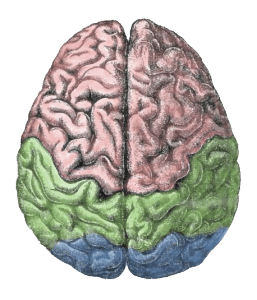Increasing Evidence that Social-Emotional Education is Important

“Cerebral lobes” by derivative work of this – Gutenberg Encyclopedia. Licensed under CC BY-SA 3.0 via Wikimedia Commons
This article explores ways to think about re-structuring our educational system to more fully support educators and students in a world that has changed immensely since the beginning of the public school system. We are living in a much different world and the way we approach education hasn’t kept up.
“…society must decide what it wants to be: interconnected individuals responsible to a community or a world filled with “consumers,” dependent on products, services and authority figures.” John Abbott, 21st Century Learning Initiative
“Much of the disaffection with the school system stems from a pervasive feeling that the intense focus on formal academics has inadvertently neglected the rest of a child’s personality and humanity. While employers, psychologists and other researchers have repeatedly noted that social and emotional skills like empathy are some of the most important ones for success, many schools still lag in developing effective programs to nurture those soft skills.” Katrina Schwartz
Enter social-emotional education. With the newest revelations in brain development research, it is possible to more purposefully approach education in ways that are meaningful to our kids. Scientists like Dr. Dan Siegel believe that adolescence is a crucial time in brain development that offers the potential for us to impact lifelong patterns of thought and behavior by emphasizing certain neurological pathways. Because the prefrontal cortex is not fully developed in a human brain until around age 24, there is a lot of opportunity to shape it positively during the teen years. (The prefrontal cortex is the portion of the brain that integrates emotion and behavior, brain and body, and ultimately is responsible for how we choose to act, especially in the most stressful situations.) One way to strengthen the prefrontal cortex is through mindfulness.
The double-whammy of adolescence is that, not only is the prefrontal cortex undeveloped, but the emotion centers of the brain are overactive during these years. This is why kids ages 10-20 can be so emotionally volatile and do things that we as adults cannot begin to understand. Using mindfulness to interrupt the sudden swells of emotion has been shown to be effective in stress management for individuals and reducing incidents of relational aggression in school communities.
The beautiful thing about these techniques lies in the malleability of the brain itself. The more you practice something, the easier it gets. Giving kids the tools to implement mindfulness as their brains are developing means that those responses will be more automatic as they age and are likely to ultimately reduce anxiety and aggression in their adult lives as well.
Unfortunately, many teachers are overwhelmed with the tasks they are already expected to do in any given day, and carving out time for one more set of lessons can feel impossible. That is where The SELF Project comes in. If you know a school or other organization whose kids could stand to benefit from some research-based, dynamic workshops using mindfulness, contact kari@theselfproject.com

